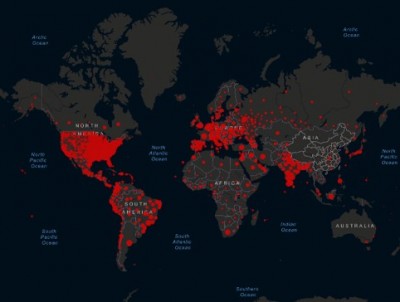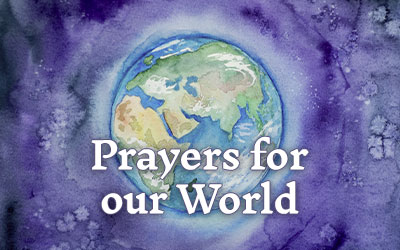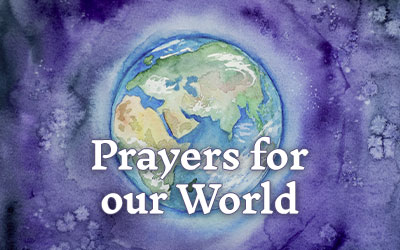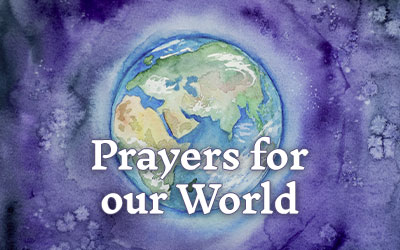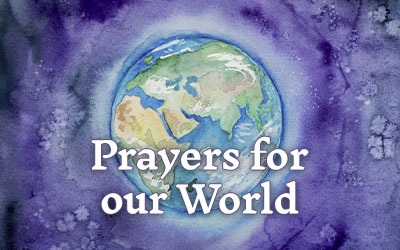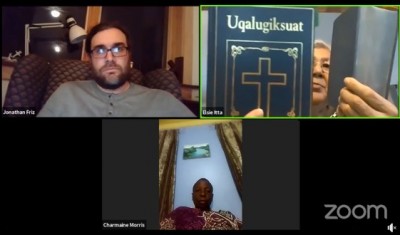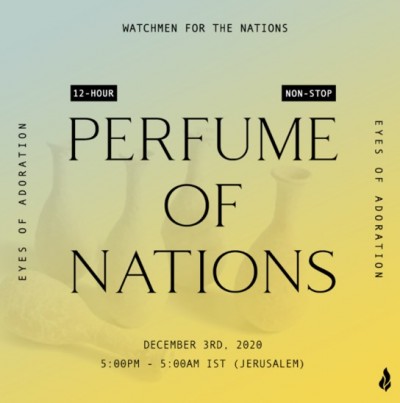A December prayer report looking at Progress with developing Vaccines, Covid-19 Hot Spots and some suggested Prayer Pointers with Links to Resources:
As of 1st December, the total global figure for people infected by Covid-19 stands at 63.5 million according to Johns Hopkins University. In addition to this, the recorded number who have died totals 1,474,643.
Covid-19 hot spots
Here are the 3 most affected countries / regions…
The US continues to be the country with the highest numbers confirmed cases and deaths related to Covid-19 globally with figures at around 13,605,981 and 269,192 respectively. The daily infection rate has increased dramatically over the past month to around 160,000 new cases per day and new deaths are projected at around 1,500 a day (7 day average) according to Worldometer.
India, which reported its first case on January 30, is the second worst-hit country in the world by the pandemic after the United States. The health ministry's most recent figures reported 31,118 infections and 482 deaths in the past 24 hours - bringing the overall case count above 9.4 million and the death toll to 137,621.
There have been at least 6,335,800 cases of the coronavirus in Brazil, according to data from state governments. As of Tuesday afternoon, 173,120 people had died. President Jair Bolsonaro announced on July 7 that he had tested positive for the virus.
Many nations are approaching or coming out of second spikes of infection cases and deaths. The economic impact has been vast, with many countries borrowing significant proportions of their GDP at rates not experienced since the second world war.
Vaccine update
Two of the vaccine trials have reported positive results in the last few weeks. Moderna said Monday that its Covid-19 vaccine continued to deliver strong efficacy results, showing 94% efficacy in the main analysis of its key study. The company said it would immediately seek regulatory clearances in the U.S. and Europe.
The milestone suggests that there could be two vaccines against the SARS-CoV-2 virus before the end of 2020. Pfizer and BioNTech released positive results for a similar vaccine on Nov. 18, and requested an emergency use authorization, or EUA, from the Food and Drug Administration two days later.
A third one, the Oxford University/AstraZeneca vaccine will undergo a new global trial as critics questioned the claim that it could protect up to 90% of people against coronavirus.
Sir John Bell, Oxford’s regius professor of medicine and the UK government’s life sciences adviser, dismissed suggestions the previous trial had not been properly set up or reported. “We weren’t cooking this up as we went along,” he said, adding that he hoped the full, peer-reviewed data would be published in the Lancet medical journal at the weekend.
In spite of the public excitement generated by the announcement that a third vaccine had been successful – with particular promise for developing countries as it is relatively cheap and can be stored at fridge temperature – AstraZeneca’s share price dropped.
There are currently more than 100 COVID-19 vaccine candidates under development, with a number of these in the human trial phase. WHO is working in collaboration with scientists, business, and global health organizations through the ACT Accelerator to speed up the pandemic response. When a safe and effective vaccine is found, COVAX (led by WHO, GAVI and CEPI) will facilitate the equitable access and distribution of these vaccines to protect people in all countries. People most at risk will be prioritized.
Over 150 countries equivalent to 64% of the world’s population have pooled efforts and resources to set up the COVID-19 Vaccines Global Access Facility, otherwise known as COVAX. The benefits of this are that all member parties can take advantage of successful vaccines produced from their collective library so that everyone will have access to a working product in the shortest time frame possible. In the event that a country’s own vaccine plans fall through, they will have a backup option in COVAX. Notably absent from this coalition are China and USA.
COVAX have now announced a plan to fairly distribute working vaccines around the world going first to front-line workers and then to those at highest risk. However, funding to provide vaccines to lower income countries is not yet sufficient as only $800 million of the $2 billion required has been raised.
Let’s Pray…
Let us continue to declare that the novel coronavirus is defeated by the blood of Jesus.
We pray for divine intervention and for God's name to be glorified even as each nation and government tries its best to flatten the curve, prevent and lessen the impact of second and third spikes and finally arrest this epidemic.
We release wisdom, skill, and integrity upon our leaders.
We pray for protection, wisdom and strength, for those working to bring treatment and comfort to the sick and their families.
We pray release and healing from mental illnesses as a result of the lock-downs.
We pray special grace and help for the vulnerable and lesser-developed nations.
We pray for refugees and displaced peoples. We pray against domestic violence and other crimes that have become rampant during lockdowns.
We pray for a safe, effective, and affordable vaccine to be released soonest but without including aborted baby cells in its creation or neglecting proper testing protocols.
We pray that the vaccine will be accessible to all nations and plead generosity of spirit from the wealthier economies.
We continue to release faith, hope, and love over the peoples of the world. May the Church seize this opportune time to manifest Jesus our Lord and Savior to those who are seeking answers and peace.
|
Join in Online Prayers: 247 Prayer Coronavirus Prayer Room God and the Pandemic – Tom Wright 19 Things to Do in response to Coronavirus |
Lausanne Resources WW11 Veteran Gets 180k Praying On a lighter note… 50 countries affected by Covid 19 sing Amazing Grace in this video Reporting from John Hopkins University: https://coronavirus.jhu.edu/data/mortality Further data on Europe and the world: https://www.ecdc.europa.eu/en/geographical-distribution-2019-ncov-cases |
President Ashraf Ghani is holding up a tentative agreement on the talks’ framework, some officials say. His aides say no agreement was near.
President Ashraf Ghani of Afghanistan has refused to let peace talks move forward even though the Taliban and government negotiators have reached a tentative agreement on the talks’ guiding principles, Afghan officials say, further stalling the process despite nearing an apparent breakthrough after months of effort.
The Taliban exposed those fault lines on Saturday when the insurgent group announced on social media that both sides had agreed to the nearly two dozen points under discussion earlier this month — a framework for how talks would go forward, including points of protocol and how issues would be presented.
But some government officials immediately pushed back on that claim, insisting that details still needed to be worked out and that no agreement had been reached. They say the Taliban were pressured by Western officials to signal a breakthrough.
Three Afghan officials with knowledge of the talks said that Mr. Ghani took exception to at least one detail, insisting that the government side be referred to by its formal name, the Islamic Republic of Afghanistan, rather than by a more generic reference.
Such details have broken down efforts to negotiate before. The Taliban’s past insistence on being referred to as the Islamic Emirate of Afghanistan — the name of their government when they were in power — derailed an effort at talks in 2013 and was a sticking point in the talks between the United States and the Taliban that eventually led to a deal opening the way for a troop withdrawal, officials said.
That the Taliban were not sticking to that title in the guiding framework this month — agreeing to less specific references to the government and insurgent sides, and to other more central points of contention — was seen as an important accomplishment.
Now, the talks have been cast into further doubt by Mr. Ghani’s demand, officials and analysts said.
In a statement on Monday, Sediq Sediqqi, an Afghan presidential spokesman, said that Mr. Ghani was “steadfast in his resolve to make the peace talks succeed and that “some of the views” in this Times article were “unwarranted and baseless,” but he did not elaborate further.
“At this stage the whole process has shifted to both sides’ convincing an international audience that the other side is disingenuous,” said Ibraheem Bahiss, an independent Afghan research analyst. “But long term, it could strengthen the hand of those within the Taliban that advocate for a military solution and view the current process as fruitless.”
American and Western diplomatic officials have not publicly responded to the breakdown. But people with direct knowledge of the talks in Doha, Qatar, have described diplomats as being frustrated with Mr. Ghani’s stance, and have suggested that the government negotiating team has been functionally split between loyalists to Mr. Ghani and other officials who are frustrated with him.
The introductory talks, which opened in hope and spectacle in Qatar in September, have unfolded over months of brutal violence back in Afghanistan. The Taliban have intensified their offensives in crucial provinces, leading the government to accuse the insurgents of holding the talks hostage with their violence.
On Sunday, a stolen Humvee laden with explosives and crewed by a suicide bomber rammed into an Afghan military base in Ghazni Province, killing at least 30 security force members, government officials said.
There may be other crucial reasons that Mr. Ghani and his aides are digging in, as well.
More: https://www.nytimes.com/2020/11/29/world/asia/afghanistan-taliban-peace-talks.html
Pray that the escalating violence and bombings in Afghanistan will stop
Pray that there will be an end to the impasse so that serious negotiations can begin
Pray for peace in Afghanistan where the people have suffered for too long
Your prayers are needed after four men were tragically murdered in an attack on a village in Indonesia by a group with links to so-called Islamic State.
Four Christian men have been murdered in a horrific attack on a village on the Indonesian island of Sulawesi on Friday 27 November. Six houses, including a makeshift church, and a Salvation Army building were also burnt to the ground. A group with links to so-called Islamic State are believed to be responsible.
At around 8am, a group of between eight and 10 men from East Indonesia Mujahidin (MIT) raided the village of Lemban Tongoa. They were armed with swords and guns and called residents out of their homes. Individuals were then singled out and killed. Three men were stabbed, and a fourth was burnt alive in his home.
Kandi loses her husband and father
Two of the men singled out were Kandi’s husband and father. After witnessing her father being killed in their home, she grabbed her children and fled.
“From where I was, I couldn't see my husband,” she recalls. “I immediately started running with my children. My mother ran into the house. I tried to stop her, but she was already captured. I said to my children: ‘That's it! It's just us now! Let's go!’ And so we ran.”
They managed to escape to safety. Thankfully, Kandi’s mother survived.
Salvation Army calls for prayer
“We find the news from Lemban Tongoa greatly disturbing,” said General Brian Peddle, leader of The Salvation Army which has a base on the island.
“Our hearts go out to our people who have been victims of evil, and to the families of those whose faith has caused such harm,” he added. “I call upon all Salvationists to pray for each person who has been affected, for the continuing witness of our people, and for healing in the communities. I ask our global community to join us in this prayer, and believe that as peace finds its place, evil will be defeated.”
"I see sadness in the eyes of the villagers"
The authorities, who have evacuated the village, have not been able to catch the attackers. East Indonesia Mujahidin (MIT) are one of several groups in Indonesia linked to so-called Islamic State. Since their leader was killed four years ago, the group haven’t carried out any attacks. But last Friday’s attack suggests they remain active.
Open Doors partners have arrived in the area to offer comfort and support. “I see sadness in the eyes of the villagers,” one partner reports. “There is a lot of emptiness in the face of Kandi whose father and husband were killed. However, when they saw us, the villagers smiled.” The team is listening to stories and will consider how to best serve the community.
Five members from church killed in Papua
The attack comes shortly after five Christians from a church in Papua, Indonesia’s easternmost province, were found dead.
In September, Pastor Yeremia was found dead. Some two months later, on 20 November, two students were shot in a jungle; one was killed, and the other wounded. A couple of days later, the bodies of three Christians were found in the same location, including a 13-year-old; they were returning home for Christmas.
The area is plagued by conflict between the TNI (Indonesian army) and armed groups. It is believed the TNI is responsible for the deaths, despite the victims not being involved in criminal groups.
PLEASE PRAY
That all those grieving, including Kandi, will know the warm embrace of God’s comfort and love
That the perpetrators of these crimes will be brought to justice, and these senseless attacks will stop
For Open Doors partners serving those affected by recent attacks, that they will ‘know the word that sustains the weary’ (Isaiah 50:4).
More: https://www.opendoorsuk.org/news/latest-news/christians-murdered-indonesia/
Thousands of Eritrean refugees in Ethiopia's conflict-hit northern region of Tigray have run out of food, the UN's refugee agency, UNHCR, has said. It appealed for urgent access to the region to provide emergency assistance.
Communications and aid access have been blocked since the conflict between the federal army and fighters loyal to Tigray leadership began a month ago.
Nearly 100,000 Eritrean refugees are in Tigray. They fled political persecution and compulsory military service.
A lot of focus has been on the tens of thousands who have fled to Sudan from Tigray during the fighting, but there is also concern about these Eritreans.
The UNHCR also said it was "alarmed" at unconfirmed reports of attacks and abductions and at the refugee camps.
Ethiopia's Prime Minister Abiy Ahmed announced on Sunday that the military offensive in Tigray had ended after federal forces took control of Tigray's capital, Mekelle.
But Debretsion Gebremichael, who leads the Tigray People's Liberation Front (TPLF), said fighting still continues and his forces have made some gains.
'Hunger a real danger'
Concerns about the state of the Eritrean refugees are growing by the hour, the UNHCR said in a briefing in Geneva.
"The camps will have now run out of food supplies - making hunger and malnutrition a real danger, a warning we have been issuing since the conflict began nearly a month ago.
"Our extreme worry is that we hear about attacks, the fighting near the camps, we hear about abductions and forced removals, so this is very important for us to have that access to go and see what has happened over there," its spokesman Babar Baloch told journalists.
The UNHCR also called for the protection of all civilians.
Mr Abiy told parliament on Monday that not a single civilian had been killed since the government launched its offensive in early November.
The government has also said it would open up a humanitarian corridor.
More: https://www.bbc.co.uk/news/world-africa-55147858
Pray for a prompt resumption of constructive peace talks
Pray for the safety of refugees and all displaced people
Pray for the UN and other organisations who are seeking to provide humanitarian assistance and food, that they will obtain safe corridors to access those in need
Pray that all those who commit atrocities will be brought to justice
At least 110 people have been killed in an attack on a village in north-east Nigeria blamed on the Boko Haram jihadist group, according to the UN humanitarian coordinator in the country.
“At least 110 civilians were ruthlessly killed and many others were wounded in this attack,” Edward Kallon said in a statement after initial tolls indicated 43 and then at least 70 dead from the massacre on Saturday by suspected Boko Haram fighters.
Boko Haram kill dozens of farm workers in Nigeria
Read more
“The incident is the most violent direct attack against innocent civilians this year,” Kallon said, adding: “I call for the perpetrators of this heinous and senseless act to be brought to justice.”
The attack took place in the village of Koshobe near the main city of Maiduguri, with assailants targeting farmers on rice fields. The Borno state governor, Babagana Umara Zulum, attended the burial on Sunday in the nearby village of Zabarmari of 43 bodies recovered on Saturday, saying the toll could rise after search operations resumed.
The assailants tied up the agricultural workers and slit their throats, according to a pro-government anti-jihadist militia. The victims were among labourers from Sokoto state in north-west Nigeria, about 1,000km (600 miles) away, who had travelled to the north-east to find work, it said. Six others were wounded in the attack and eight remained missing as of Saturday.
Kallon cited “reports that several women may have been kidnapped”, and called for their immediate release and return to safety.
The Nigerian president, Muhammadu Buhari ,condemned the attack, saying: “The entire country has been wounded by these senseless killings.”
The attack took place as voters went to the polls in long-delayed local elections in Borno state. The polls had been repeatedly postponed because of an increase in attacks by Boko Haram and a rival dissident faction, ISWAP.
The two groups have been blamed for increasing attacks on loggers, farmers and fishermen, whom they accuse of spying for the army and pro-government militias.
More: https://www.theguardian.com/world/2020/nov/29/nigeria-attack-boko-haram-farm-workers-killed
Pray that the Nigerian government will escalate their intervention in this ongoing instability
Pray that the perpetrators will be held to account for these acts of heinous violence
Pray for the families and loved ones of the victims – for comfort for all those who mourn
Pray that the kidnapped women will be freed without coming to any harm
Pray for lasting peace to return to Nigeria
During our recent Aroma prayer call, the Seed Company highlighted translation work among the Inupiaq people of Alaska.
In the Arctic Circle, in the northernmost city in the United States, translators have been working for years to make the full Bible a reality. Watch the Aroma Livestream for more details.
Prayer Points:
Pray for God to accelerate the translation work and grow the impact of Scripture as it goes out over the local airwaves (2 Thessalonians 3:1, NLT).
Pray for wisdom in correctly handling the Word of truth that communicates with the younger generation. And for them as they work to finish the book of Ecclesiastes on schedule (2 Timothy 2:15, ESV).
The pandemic is taking a great toll on the city and the translation efforts. Pray for God’s protection over the teams and the community (Psalm 91:14-16, NIV).
Praise God that the Inupiaq people have the New Testament in their language and are working hard to finish the Old Testament. Soon, they will have the full counsel of God! (Romans 16:25-26, HCSB).
The Inupiaq youth have a great desire to learn their language. The Word of God in their own language is adding dignity and transforming and preserving the Inupiaq culture (Psalm 107:2-3, ESV).
More: https://www.facebook.com/watch/live/?v=386690702526521&ref=watch_permalink
Sign up for Seed Company updates: https://seedcompany.com/
We have exciting news for you! We will continue reaching people with the Gospel in 2021!
GO 21 is the first step in our efforts to reach the whole world with the Gospel and the kick-off of the GO Decade (2021-2030). After what we have seen with GO 2020, we believe it is possible to reach the whole world by 2030!
We are dedicating the month of May 2021 to prayer and evangelism to reach people with the Gospel. Many denominations and ministries have agreed to be part of GO 21 to mobilize 100 million believers to reach 1 billion people with the Gospel of Jesus Christ. It will kick off with Global Prayer on May 1-2.
Please help us to get the word out!
We encourage you to share this flyer with the cause of reaching people with the Gospel with your whole network. Please help us to spread the news. Let's stand together to mobilize as many believers as possible.
The main goal of Global Outreach is to train, equip, and mobilize believers to share their faith and develop an evangelistic lifestyle. This effort can't be accomplished with just one organization. We all know that only together can we achieve this goal.
The annual agenda (GO 21, GO 22 …) is a catalyst for an evangelistic lifestyle and church growth and contributes to the goal of the GO Decade: To share the Gospel with every person until 2030.
Together we can reach the world! - see www.go21.world
Download Media Pack | Download Flyer | Watch the Video Promo
Werner Nachtigal - Global Outreach Day / GO 21 / Go Decade
The global Bride from every nation, colour, tribe, and tongue is getting ready for her Bridegroom. We see Jesus extending His hand to us to join in His dance. With our eyes locked upon His, our movement will come into alignment — the Bride and Bridegroom becoming one.
Join us on Thursday, December 3rd from 5:00PM IST (Jerusalem) / 7:00AM PT (Vancouver) as we come together to fix our gaze on Him through 12 hours of consecutive worship. Let our perfume rise from different nations across the globe.
We believe that this will set the tone for the month of December; a time of consecration where the Spirit of God will seal the Bride’s utter devotion to her Bridegroom.
More details: https://watchmen.org/upcoming/2020/12/3/12-hour-perfume-of-nations
